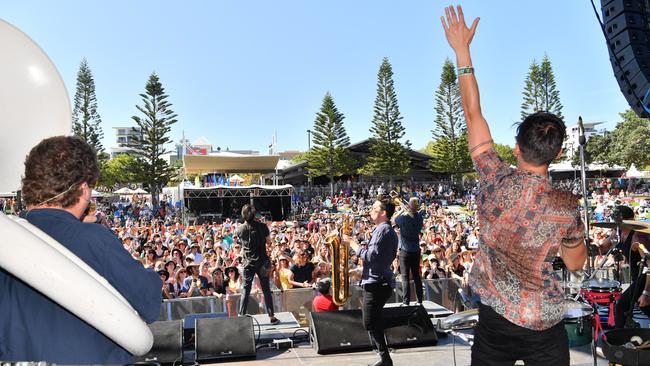Sunshine Coast music: Caloundra Music Festival financial performance reports could still be several years away
The latest financial reports for the Caloundra Music Festival could still be several years away from reporting as a review into its future rolls on.

Sunshine Coast
Don't miss out on the headlines from Sunshine Coast. Followed categories will be added to My News.
The financial performance of one of the region’s largest music festivals may not be known for several years as a review into its future nears completion.
The ratepayer-funded Caloundra Music Festival’s next release of financial reports aren’t due to be provided to the Sunshine Coast Council until the end of the current funding cycle, due to expire in the 2022-23 financial year.
The festival’s future would become clearer in September when a review of it and other council business activities was presented to councillors.
The review had been ordered to determine if the festival and other council activities should be identified as a business or not and had the national competition policy applied.
The result could be that the festival ended up out to the private sector to deliver, having been a council-run event since it started in 2007.
In early-2019 a report due to go before the council revealed the festival had cost ratepayers an average of more than $675,000 a year for the previous three years.
The council reported the 2019 edition of the festival had generated “direct and incremental expenditure of $4.4m attributable to the Sunshine Coast region economy” and about $1.4m had been spent locally on procurement.
In February, 2019 the festival’s performance was outlined at a council ordinary meeting.
Council officers advised the 2016-2018 festivals had stayed within their funding provision of $750,000 ($250,000 a year).
The 2016 edition ran at a net loss of $146,640 compared to net losses of $359,148 in 2017 and $203,542 in 2018.
Those results excluded staff and “corporate on-costs” but fell within the council’s provision of $750,000 over three years.
Internal and staffing costs were presented separately for the three festivals.
The Caloundra Music Festival was managed internally by the council’s Major Events Delivery Team within the Economic Development Branch.
In 2016 the Major Events Delivery Team’s total administration costs were $470,309 compared to $468,732 in 2017 and $425,640 in 2018.
Those total costs covered a range of events and did not solely represent Caloundra Music Festival costs.
Council officers explained in 2019 that the 2017 event cost had been higher due to it being the 10-year anniversary event with higher headline act costs and event infrastructure.
The council had also outsourced large portions of the festival management via national tender to reduce the council’s exposure and risk and improve the bottom line.
The desired efficiencies weren’t achieved and the contract was re-assessed and returned to more local or Queensland-based suppliers where possible.
A council spokeswoman said the financial reports for the 2020-2022 events would be provided to the council at the end of the current funding cycle.
The 2020 event wasn’t held due to Covid-19 and the 2021 event scheduled for October 1-3 would not go ahead if further restrictions were ordered with tickets to automatically transfer to the 2022 event.
“For more than a decade, the Caloundra Music Festival has delivered significant economic, social and cultural benefits to our community,” the spokeswoman said.
“The economic value to the Sunshine Coast region has increased year on year – $4.4 million in 2019, however the event’s success is not determined solely by economics.”




